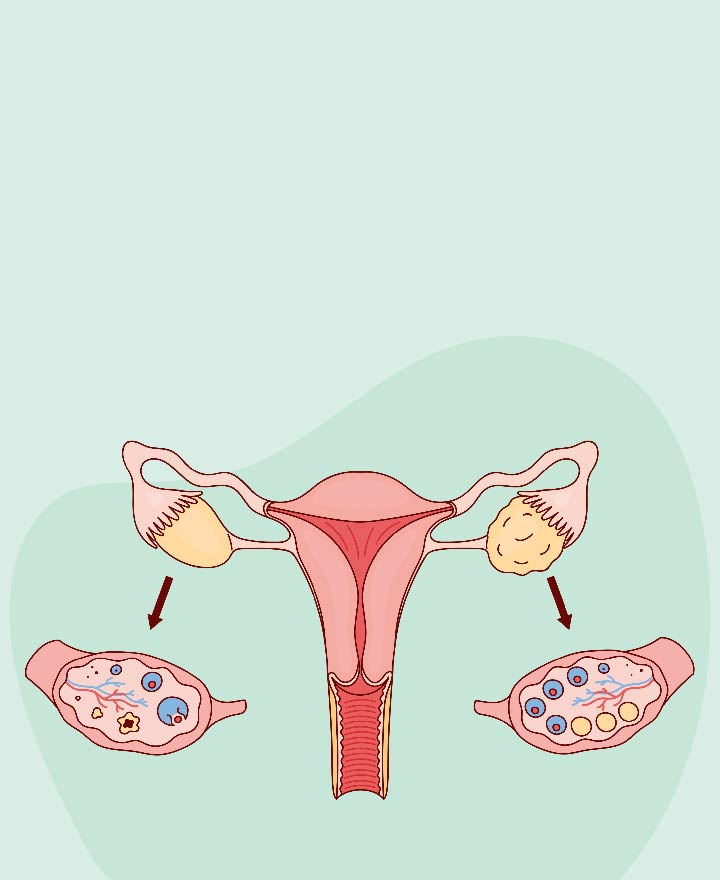

PCOS vs PCOD: Understanding the Differences
PCOS (Polycystic Ovary Syndrome) and PCOD (Polycystic Ovary Disease) are often used interchangeably, but they are actually slightly different conditions. Take a look at the article to know more.
What is PCOD?
PCOD is a medical condition in which the woman ovaries produce immature or partially mature eggs in large numbers and over the time these become cysts in ovaries. Due to this ovaries become large and secrete large amount of male hormones (androgens) causing infertility, irregular menstrual cycles, hair loss and abnormal weight gain. PCOD can be controlled by diet and lifestyle modifications. PCOD is generally considered to be a milder form of polycystic ovary syndrome.
What is PCOS?
PCOS is a metabolic disorder of the endocrine system in which the woman is affected by hormonal imbalance in their reproductive years. It is a more complex condition in which high amounts of male hormones are produced that leads to irregularity in ovulation causing formation of lot of cysts in the ovary. In addition to irregular periods and difficulty getting pregnant, PCOS can cause symptoms such as weight gain, acne, excess hair growth, and insulin resistance.
Differences between PCOD vs PCOS
Both the medical conditions are associated with ovaries and hormonal imbalance in women during their reproductive age (between 12 and 51 years) and though they depict same symptoms, here are few differences every female should know:
1. PCOD is a common disorder, 10% of world women population affected by it. On the other hand, PCOS is a serious medical condition around 0.2% to 2.5% of world women population affected by it.
2. PCOD is a condition in which ovaries produce many immature or partially mature eggs and this happens due to poor lifestyle, obesity, stress and hormonal imbalance. While, PCOS is a metabolic disorder and a more severe condition where ovaries stop releasing eggs.
3. PCOD doesn’t affect fertility in women, in this condition woman still can ovulate and become pregnant with some extra precautions and little medical intervention. On the other hand, PCOS seriously affects fertility in women. As there are too many hormonal irregularities, conception is much harder in this case. While medications can be taken to increase fertility if one has PCOS, it usually results in increased chances of twins/multiple births.
4. PCOD doesn’t have any serious complications. On the other hand, PCOS have serious complications such as type 2 diabetes, heart disease, high-blood pressure and endometrial cancer in later stage.
5. PCOD can often be managed just by making informed lifestyle changes, and may not even require further medical treatment at all. PCOS however is a disorder of the endocrine system - it has more threatening implications and its treatment almost always requires external hormone intake.
Conclusion
Both PCOS and PCOD are diseases that involve our ovaries and hormones but have certain differences. While PCOS is more severe than PCOD, both can be treated if they are detected in time. Following a healthy diet and fitness regime can help control the symptoms and improve the hormonal imbalances which occur because of PCOS and PCOD. One of the important components of our overall wellness is also being financially secured. Healthcare emergencies can happen any time, but a good health insurance policy can protect you from such uncertain situations. To know more about it, click here.
Source: Healthline, WebMD
Disclaimer: This blog provides general information and discussions about health and related subjects. The information and other content provided in this blog, website, or in any linked materials are not intended and should not be considered, or used as a substitute for, medical advice, diagnosis, or treatment. Kindly contact your doctor before starting a new medicine or health regime.
Related Articles
Polycystic ovary syndrome - food to eat and avoid
Menstrual Hygiene Tips Every Girl And Women Should Know
Weight gain diet plan for women
Thyroid – All about the Gland, Hormone, Test, Levels, and Insurance
PCOS and PCOD: Causes, Symptoms and Treatment
Published on July 15, 2023

















 Health Insurance
Health Insurance  Travel Insurance
Travel Insurance  Car Insurance
Car Insurance  Cyber Insurance
Cyber Insurance  Critical Illness Insurance
Critical Illness Insurance
 Pet Insurance
Pet Insurance
 Bike/Two Wheeler Insurance
Bike/Two Wheeler Insurance  Home Insurance
Home Insurance  Third Party Vehicle Ins.
Third Party Vehicle Ins.  Tractor Insurance
Tractor Insurance  Goods Carrying Vehicle Ins.
Goods Carrying Vehicle Ins.  Passenger Carrying Vehicle Ins.
Passenger Carrying Vehicle Ins.  Compulsory Personal Accident Insurance
Compulsory Personal Accident Insurance  Travel Insurance
Travel Insurance  Rural
Rural